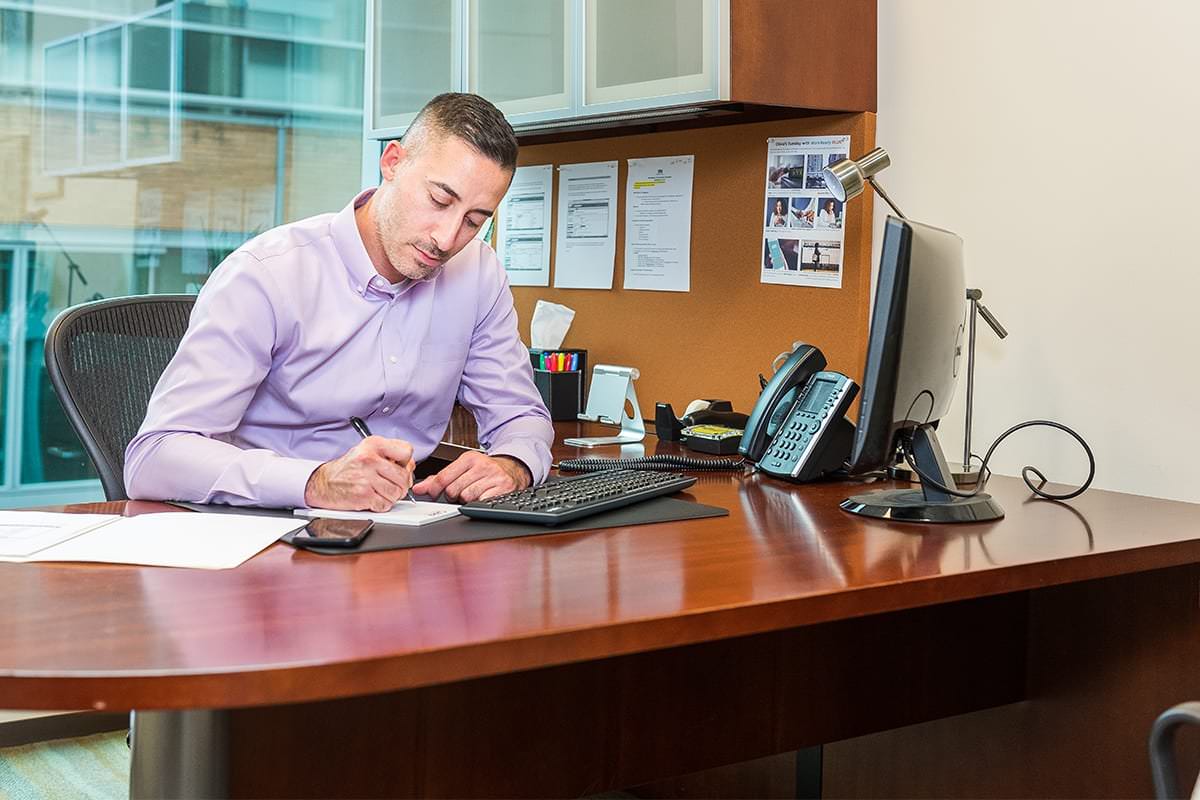Premier Access: Up to 2 Months Free at Select Locations. Learn More
Carr Workplaces
Legal Coworking Guide: How Lawyers Can Use Shared Office Spaces
Sep 23rd, 2020 
With today’s ever-changing times, we are continually seeing unprecedented shifts of work culture within different professions – the legal industry is no exception.
Since the spread of the novel coronavirus, the prevalence of remote work and freelance work has skyrocketed with professionals around the country looking for new, innovative ways to be productive.
Within the legal industry, terms such as freelance lawyers, remote lawyers, and solo attorneys have begun to garner and gain traction amongst those shifting how and where they work. With this massive shift in the realm of attorneys, coworking spaces for lawyers have become a hot commodity for these different types of lawyers.
But what do these phrases mean? Let’s take a closer look.
Freelance Lawyers
What Are Freelance Lawyers?
Freelance Lawyers – often referred to as contract lawyers – are those who do legal work but have no association to a law firm. Hence the use of the term contract lawyer, freelance lawyers work for themselves as an independent entity and work through written agreements.
With many seeking work within their respective field due to the negative implications of COVID-19, freelance work has become a way for many to keep busy and to find new opportunities.
How Can Freelance Lawyers Benefit From Coworking?
Anyone with previous legal experience can become a freelance lawyer as you’re working independently from a law firm. Whether it’s utilizing a dropping into a serviced office space and utilizing a physical workspace or accessing remote business services, coworking offers a variety of benefits and services to freelance lawyers.
Job listing sites such as LinkedIn, Indeed, and ZipRecruiter feature ample postings related to freelance lawyer work – which is a great place to start. Networking at a shared office space for lawyers and other professionals in a major city like New York or DC is another great way to quickly build a catalogue of notable clients.
Remote Lawyers
What are Remote Lawyers?
Remote lawyers, on the contrary, are lawyers who work for pre-existing law firms but function only on a virtual, or off-site capacity.
How Can Remote Lawyers Benefit From Coworking?
While many have enjoyed and experienced heightened productivity and comfortability during this period of remote work, others have had to cope with distractions that in the past, were separate from their work life.
Young children, needy pets, the couch being just a bit too comfortable – all circumstances that many working professionals, such as a remote lawyer, have had to contend with.
 Finding a way out of the house through alternatives such as dropping in and working at a community café, within a coworking space, or from a private office, could be the new key for these professionals to steering clear from these ample day-to-day distractions. These three different workspace options allow for flexibility while also providing business services to help remote lawyers operate at a high level.
Finding a way out of the house through alternatives such as dropping in and working at a community café, within a coworking space, or from a private office, could be the new key for these professionals to steering clear from these ample day-to-day distractions. These three different workspace options allow for flexibility while also providing business services to help remote lawyers operate at a high level.
Like What You’re Reading? Enjoy a Free Trial on Us
Fill out the form below to get started:
Solo Attorneys
What Are Solo Attorneys?
While remote lawyers primarily function as an employee of a larger law firm, solo attorneys are those who own and independently operate their own law firm – and yes, a solo attorney can also exist as a remote lawyer if their firm is completely virtual.

Given their size, solo law firms are often limited in their capabilities so providing laser-focused, top-of-the-line client service is imperative for these professionals.
How Can Solo Attorneys Benefit From Coworking?
By using coworking products such as business phone service – which provides a professional first point of contact – or a virtual business address, solo attorneys can instantly enhance their image and gain a competitive edge against other smaller firms.
In today’s ever-changing world, it has become increasingly important for professionals such as the solo attorney to stand out from the rest. Whether it be through creating personal goals, creating a business vision that includes a mission and values, or establishing the core client services you will offer, there are many innovative ways to start a solo law firm.
Document Review Attorneys
What Are Document Review Attorneys?
On the flip side, a document review attorney often works as a part of a larger team, evaluating and finding documents for lawyers and then subsequently reviewing and analyzing data to determine if it is relevant to a particular case.
How Can Document Review Attorneys Benefit From Coworking?
Coworking providers often feature managed document review space for these teams to work together in – although COVID-19 has shifted the landscape around document reviews as we practice physical distancing.
Like freelance lawyers, document review attorneys are often contracted on a case-by-case basis, meaning that there are often open opportunities for professionals to garner new legal experience by networking at an attorney coworking space.
Legal Consultants
What Are Legal Consultants?
And finally, there are legal consultants – sometimes referred to as legal advisors – are those who provide legal guidance to clients and businesses.
Although many of these professionals often have the same training as lawyers, they are known to give advice outside of the courtroom.
How Can Legal Consultants Benefit From Coworking?
Within a coworking environment, legal consultants can enjoy the prestige that comes with their own private office as they work with a variety of clients. Like freelance lawyers, a coworking environment is an awesome place to network and land deals with other business professionals.
As the legal profession features a broad number of varying occupations, coworking providers are here to meet the needs of these professionals.
Whether it be for a budding freelance lawyer, an established remote lawyer, the smallest solo attorney, a large team of document reviewers, or an experienced legal consultant, our nationwide locations are designed to be the perfect coworking spaces for lawyers to work within today’s ever-changing atmosphere.
[gravityform id=”3″ title=false description=false ajax=true]